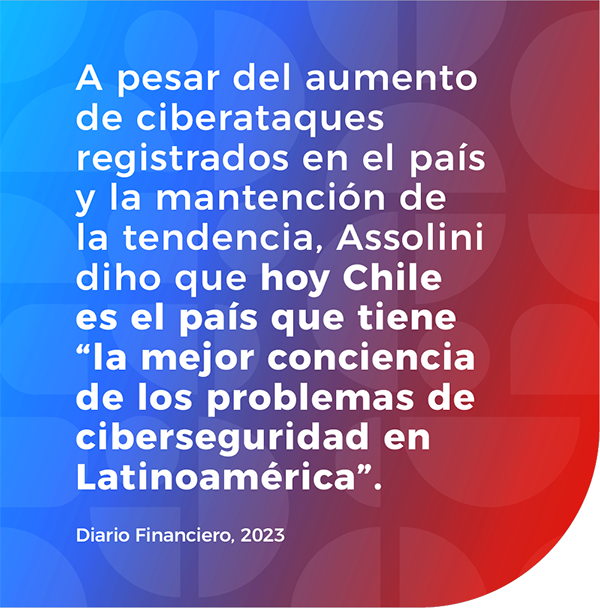
Cyberattacks rise sharply in Chile during the first half of the year
The country recorded a worrying increase in cyber-attacks in the first six months of the year.
Data from the multinational firm Kaspersky, indicated that there were 37 thousand ransomware attacks - data hijacking - during the first half of this year, compared to the 12 thousand recorded in the same period of 2022.
This type of threat, which aims to make the affected party pay a ransom for their data, is one of the most feared. One of the biggest attacks, known as WannaCry, occurred in 2017, when some 20 thousand victims from 150 countries were demanded to pay.
The increase comes in the midst of the passage of the Cybersecurity and Critical Information Infrastructure Framework Law, which creates a governance model that promotes risk management and the implementation of cybersecurity standards and is expected to be approved this year.
The director of the Latin America research and analysis team for Kaspersky, Fabio Assolini, pointed out that the country also saw an increase in cyber-attacks on mobile devices, such as cell phones, with 23,000 cases compared to 13,000 in the first half of last year.
The expert also warned that in Chile there was an increase in the circulation of two families of malicious code (viruses) during the first half of the year, known as ransomware in mobile threats and Rhysida, the same that attacked the Army.
While they do not have a distinction with the other virus groups, Assolini explained that once they gain access to devices and systems, the latter lose files and databases, a factor used by criminals to demand a monetary ransom.
In the case of the 37,000 ransomware cyber-attacks, the Executive explained that they mainly targeted private companies and government entities.
Pandemic Effect
Assolini affirmed that attacks at a global level are not increasing, as the trend shows a decrease in their number. However, in Latin America, including Chile, the scenario is the other way around, where there is a "considerable" increase.
The executive explained the increase as a consequence of the Covid-19 pandemic and the massification of teleworking.
Assolini commented that the quarantines also saw the emergence of more cybercriminals, which catapulted the increase in attacks, which grew by 64% globally during that period.
Attacks on the rise, but greater awareness
Kaspesky's projections are not very optimistic. Assolini said that by the second half of 2023 they see no major changes in trends and that threats, mainly mobile, will continue to grow.

Ransomware will continue to be a problem, especially for government entities and corporations, while for the home user the main threat will be attacks on personal telephones (...), the number of attacks will surely grow, I don't see major changes", he estimated.
Despite the increase in cyber-attacks registered in the country and the continuation of the trend, Assolini said that today Chile is the country that has "the best awareness of cybersecurity problems in Latin America".
He also pointed out that the country has a good national strategy for cybersecurity and critical infrastructure protection, and highlighted the work of the Computer Security Incident Response Team (CSIRT).
Having entities that do this analysis work and share this information is very important, because it allows you to prepare in advance. But you have to be clear that a good cybersecurity strategy does not make you free from attacks," he said.
Regulation and challenges
Regarding the draft Framework Law on Cybersecurity and Critical Information Infrastructure, he commented that it is key to move forward, because it would allow "having a basis" so that governments can develop better public security policies.
While appreciating this project, he cautioned that, based on experience with other legislation, it is important to update legal frameworks periodically in the face of new trends and threats.
In relation to local companies and organizations, he commented that, although they are taking precautions against the dangers of cybersecurity, they are still not enough, because more than installing a product, a robust infrastructure is required, with different layers".
We devise cybersecurity strategies that allow you to have the best consulting, tools, implementation services and managed services through our Security Operations Center (SOC). Learn more here
Source: Diario Financiero





